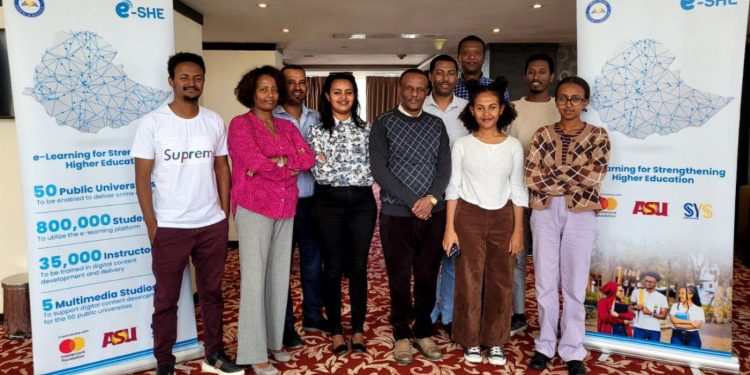The e-Learning for Strengthening Higher Education (e-SHE) program, which is jointly implemented by the Ministry of Education, Mastercard Foundation, Arizona State University (ASU), Shayashone PLC (SYS), and the 50 public universities, organized a two-day training on safeguarding for its staff members in collaboration with the Foundation at Best Western Plus Hotel on November 21 and 22, 2023.
In the training session in which 12 e-SHE staff members took part, the topics focused on an introduction to safeguarding, power, and privilege, the fundamental pillars of safeguarding (awareness, prevention, reporting, and responding), and the draft Safeguarding Policy for SYS.
Dr. Getahun Mekonen from e-SHE delivered the training, while Monaliza Bekele, Mastercard Foundation’s Safeguarding Lead also took part in the sessions, and clarified important issues related to safeguarding.
With the view to setting the stage for productive training, the e-SHE staff was given the chance to reflect on their expectations and concerns about the training. Accordingly, their reflections guided the course of the training, particularly in making it more focused on practical aspects in the e-SHE context. The training was delivered in a manner that considers the program’s contexts to make it relevant and applicable to its activities.
In light of safeguarding, the group discussion, presentation, and reflection sessions focused on how power affects the issues of safeguarding in the program, what situation of power exercise can expose the program to safeguarding risks, the safeguarding risks that the staff anticipate in e-SHE program implementation, the most vulnerable groups, how to mitigate the identified risks and the possible barriers to responding to safeguarding risks (the specific contexts of young people and staff members).
The e-SHE staff members actively participated in the discussions and presentations and forwarded their comments on the draft safeguarding policy. They reflected on incidents of safeguarding issues that might arise due to power and privilege issues on staff, students, and instructors involved in the program. The e-SHE staff members also identified safeguarding issues in the implementation of the program, the most vulnerable groups to safeguarding risks, and the means to mitigate the risks identified.
One of the major focuses of the training was the e-SHE members’ discussion on preparing a safeguarding policy for SYS. As e-SHE is not an organization, but rather a program, that involves several stakeholders including the five implementing partners and program targets, the participants raised their concerns that this setup makes it difficult to prepare a Safeguarding Policy. Hence, they agreed the preparation of the safeguarding policy shall fall under the umbrella of SYS. This will also enable to use of the policy in other programs implemented by SYS. The team also formed groups and forwarded their respective comments on the draft Safeguarding Policy.
They also discussed issues related to staff’s relationship with other community members outside of their work in terms of the safeguarding principles and inclusiveness in the preparation of e-learning content. The participants reached a consensus that understanding power helps to recognize and prevent the risk of abuse and exploitation. Hence, the program needs to put in place policies and practices to prevent, report, and respond to incidents of safeguarding.
As a way forward, the team agreed to:
- Incorporating the comments and revising the policy document for endorsement,
- Sharing the draft policy with the Ministry of Education and ASU to incorporate their feedback and organizing a briefing session for them as well,
- Sharing the policy document with the SYS legal advisor so that they can review it from a legal perspective and
- Aligning the Human Resource Manual, contracts, and agreements with the safeguarding
policy.

